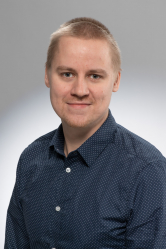Would better sleep enhance the recovery of intensive care patients?
The majority of patients in intensive care suffer from insufficient and interrupted sleep, which has a negative impact on their well-being. The knowledge is largely based on patients’ subjective experiences. The current research aims at providing scientific information about the matter utilizing methods based on, for example, machine learning.Published: 7.7.2022
Writer: Sami Nikkonen
Image: Shutterstock
Poor sleep is a common phenomenon in intensive care units (ICU), with the majority of patients suffering from insufficient and interrupted sleep. The factors contributing to poor sleep include, for example, pain, noise, disturbing sounds and excess lighting, as well as treatments and care and their non-optimal timing. In addition to tiredness, poor sleep has other negative impacts on both the mental and physical well-being and recovery of the patients. Sleep among intensive care patients has not, however, been throughly investigated, and our knowledge about the poor quality of sleep is largely based on subjective observations and the patients’ evaluations. This is primarily because the traditional sleep assessment methods are not suitable for use in intensive care units.
Polysomnography is a traditional sleep assessment method that measures various biosignals, such as brain, muscle and heart activity as well as breathing, movements and oxygen saturation. The preparations for a polysomnographic recording, including the placing of electrodes, are time-consuming and require qualified personnel. Moreover, plenty of manual work is needed for the analysis of polysomnographs and scoring of sleep stages. Thus, because of its complexity and cost, traditional polysomnography is poorly suited to use in ICUs.
However, for the purposes of monitoring sleep quality and sleep staging, new methods based on machine learning have been developed to offer more compact measurement setups than those used in traditional polysomnography. One method that is particularly suitable for clinical application in ICUs involves the use of the photopletysmography (PPG) signal, which is obtained with a pulse oximeter. Previously, our research group has developed methods based on machine learning and neural networks to facilitate automated sleep stage classification from the PPG signal. Measuring the PPG signal is simple and carried out as part of the monitoring of oxygen saturation for all intensive care patients. Thus, the monitoring of their sleep would not require the use of any extra sensors or potentially disturbing procedures. Because the method is automated, no labour-intensive manual analysis is required either.
With funding received from the Sakari Alhopuro Foundation, our research project aims to validate methods for the monitoring and assessment of sleep among patients in intensive care. Our aim is to objectively examine the quality and quantity of sleep and to compare the findings with earlier subjective observations.
In addition, we aim to study the sleep environment in the ICU context with a specific focus on determining the major sleep-disturbing factors and their impact in more detail. For example, we will study what type of sounds or noise are the most disturbing and to find solutions to avoid them. In addition, we investigate the timing of treatments and care to avoid interrupting the cycles of deep sleep, which support the recovery of patients.
The acquired research data will be used to optimise the sleep environment in ICUs. In other words, we aim is to minimise any sleep disturbing factors without compromising the normal activities of the ICU ward. The ultimate purpose of the project is to explore the impacts of changes in the sleep environment on the quantity and quality of sleep as well as their potential influence on the recovery of patients.

Ph.D. Sami Nikkonen works as Postdoctoral Researcher in the Department of Applied Physics of the University of Eastern Finland and the Imaging Center of Kuopio University Hospital. In his research, Nikkonen focuses on sleep recordings and sleep disorder diagnostics. Nikkonen earned his Ph.D. from the University of Eastern Finland in 2020. His thesis concerned new methods for enhanced diagnostics of obstructive sleep utilizing computational tools and deep learning.
